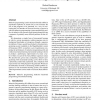98 search results - page 9 / 20 » Experience in the Automatic Parallelization of Four Perfect-... |
AAIP
2009
13 years 9 months ago
2009
Inductive programming systems characteristically exhibit an exponential explosion in search time as one increases the size of the programs to be generated. As a way of overcoming ...
TPDS
2002
13 years 7 months ago
2002
One of the most fundamental problems automatic parallelization tools are confronted with is to find an optimal domain decomposition for a given application. For regular domain prob...
LCPC
2007
Springer
14 years 2 months ago
2007
Springer
Abstract. As parallelism in microprocessors becomes mainstream, new programming languages and environments are emerging to meet the challenges of parallel programming. To support r...
IPPS
2007
IEEE
14 years 2 months ago
2007
IEEE
Automatic library generators, such as ATLAS [11], Spiral [8] and FFTW [2], are promising technologies to generate efficient code for different computer architectures. The library...
TACAS
1997
Springer
14 years 3 hour ago
1997
Springer
This paper describes a compositional approach to generate the labeled transition system representing the behavior of a Lotos program by repeatedly alternating composition and reduc...

